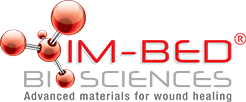29 Jul Imbed Biosciences receives $1.5M federal grant
 Imbed Biosciences, Inc. announced today that it has been awarded a $1.5M competitive Small Business Innovation Research (SBIR) Phase II grant from National Institute for Arthritis and Musculoskeletal and Skin Diseases (NIAMS), a division of National Institutes of Health (NIH).
Imbed Biosciences, Inc. announced today that it has been awarded a $1.5M competitive Small Business Innovation Research (SBIR) Phase II grant from National Institute for Arthritis and Musculoskeletal and Skin Diseases (NIAMS), a division of National Institutes of Health (NIH).
Ankit Agarwal, PhD, Founder/CEO of Imbed and the Principal Investigator on the grant, said, “this award will support the development of a polymeric nanofilm dressing containing silver nanoparticles that allows closure of hard-to-heal wounds without infection or silver toxicity”. In Phase I, the company validated the feasibility of employing this ultrathin conformal wound dressing in murine wounds. “We demonstrated that polymeric nanofilms releasing 100 times less silver than conventional silver dressings significantly reduced bacterial colonization in contaminated dermal wounds in mice and expedited wound closure. The dressing is engineered to provide optimal antimicrobial barrier to wounds for healing without a high content of silver”, said Agarwal.
“The competitive award validates the uniqueness of this polymeric nanofilm technology, along with the market demand of better antimicrobial dressings. A significant merit of the approach is that the concept is adaptable to delivery of a wide range of bioactive molecules for various topical diseases, thus potentially providing a broadly applicable healthcare materials platform”, said co-founder Nicholas L. Abbott, PhD, Professor in Department of Chemical and Biological Engineering at University of Wisconsin-Madison.
“This next-generation wound dressing will be applicable at the onset of any wound treatment plan without concern of silver toxicity. It would directly impact care for large patient populations at risk of wound infections in burn units and chronic wound healing centers. The nanofilm dressing ultimately degrades in the wound over time, potentially reducing the cost and frequency of painful dressing changes”, said co-founder Prof. Michael J. Schurr, MD, a burn and trauma surgeon in the School of Medicine at University of Colorado, Denver.
The Phase II research funding will be used to complete the biocompatibility profile of the nanofilm dressing and test it in contaminated split-thickness wounds in pigs. “Wound healing in pig skin is very similar to human skin. Clinical data from porcine wounds will be used to obtain regulatory clearance for clinical trials in human patients”, said co-founder Prof. Jonathan F. McAnulty, DVM, PhD, who will be leading all porcine studies as a part of this grant in School of Veterinary Medicine at University of Wisconsin-Madison.
“Wound healing research is an important component of the NIAMS portfolio. It is part of an effort to reduce the impact of human skin wounds on public health and the economy. This SBIR Phase II award to Imbed Bio reflects our commitment to meet this public need,” said Dr. Hung Tseng, Program Director of the Skin Repair, Regeneration and Pigmentation Program in the Division of Skin and Rheumatic Diseases at the NIAMS.
Along with Abbott, Schurr and McAnulty, scientists formally collaborating with the company on this project also include: Prof. Charles J. Czuprynski, PhD in School of Veterinary Medicine at University of Wisconsin-Madison; and Prof. Christopher J. Murphy, DVM, PhD in School of Veterinary Medicine at University of California, Davis. “We have a team of renowned experts in surface engineering, microbiology and surgical sciences committed to bring this wound healing nanofilm technology into clinics”, said Agarwal.


